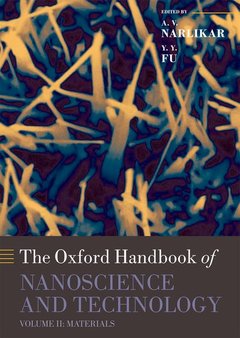Description
Oxford Handbook of Nanoscience and Technology
Volume 2: Materials: Structures, Properties and Characterization Techniques
Oxford Handbooks Series
Coordinators: Narlikar A.V., Fu Y.Y.
Language: English
Subjects for Oxford Handbook of Nanoscience and Technology:
Publication date: 02-2010
960 p. · 19.4x25.2 cm · Hardback
960 p. · 19.4x25.2 cm · Hardback
Description
/li>Contents
/li>Biography
/li>
This is an agenda-setting and high-profile book that presents an authoritative and cutting-edge analysis of nanoscience and technology. The Oxford Handbook of Nanoscience and Technology provides a comprehensive and accessible overview of the major achievements in different aspects of this field. The Handbook comprises 3 volumes, structured thematically, with 25 chapters each. Volume I presents fundamental issues of basic physics, chemistry, biochemistry, tribology etc. of nanomaterials. Volume II focuses on the progress made with host of nanomaterials including DNA and protein based nanostructures. Volume III highlights engineering and related developments, with a focus on frontal application areas. All chapters are written by noted international experts in the field. The book should be useful for final year undergraduates specializing in the field. It should prove indispensable to graduate students, and serious researchers from academic and industrial sectors working in the field of Nanoscience and Technology from different disciplines including Physics, Chemistry, Biochemistry, Biotechnology, Medicine, Materials Science, Metallurgy, Ceramics, Information Technology as well as Electrical, Electronic and Computational Engineering.
1. Optical Properties of Carbon Nanotubes and Nano-Graphene. 2. Defects and Disorder in Carbon Nanotubes. 3. Roles of Shape and Space in Electronic Properties of Carbon Nanomaterials. 4. Identification and Separation of Metallic and Semiconducting Carbon Nanotubes. 5. Size Dependent Phase Transitions and Phase Reversal at the Nanoscale. 6. Scanning Transmission Electron Microscopy of Nanostructures. 7. Harmonic Detection of Resonance Methods for Micro- And Nano-Cantilevers: Theory and Selected Applications. 8. Microspectroscopy as a Tool to Discriminate Nano-Molecular Cellular Alterations in Biomedical Research. 9. Holographic Laser Processing for Three-Dimensional Photonic Lattices. 10. Nano-Analysis of Materials Using Near-Field Raman Spectroscopy. 11. Scanning Squid Microscope Study of Vortex States and Phases in Superconducting Mesoscopic Dots, Antidots, and Other Structures. 12. New Phenomena in the Nano-Space of Single Wall Carbon Nanotubes. 13. Thermopower of Lowdimensional Structures: the Effect of Electron-Phonon Coupling. 14. Zno Wide Bandgap Semiconductor Nanostructures: Growth, Characterization and Applications. 15. Selective Self-Assembly of Semimetal Straight and Branched Nanorods on Inert Substrates. 16. Nanostructured Crystals: an Unprecedented Class of Hybrid Semiconductors Exhibiting Structure-Induced Quantum Confinement Effect and Systematically Tunable Properties. 17. Nanoscale GE1-XMNxTE Ferromagnetic Semiconductors. 18. Synthesis, Characterization and Environmental Applications of Nanocrystalline Zeolites. 19. Unusual Properties of Nanoscale Ferroelectrics. 20. Magnetic Properties of Nanoparticles. 21. Structural, Electronic, Magnetic, and Transport Properties of Carbon-Fullerene Based Polymers. 22. Magnetic Nanowires: Fabrication and Characterization. 23. Iron Oxide Nanostructures with Emphasis on Nanowires. 24. DNA-Based Self-Assembly of Nanostructures. 25. Properties and Potential of Protein-DNA Conjugates for Analytic Applications.
Dr A.V. Narlikar took his Ph.D. in superconductivity at Cambridge University. He has worked in the field of superconductivity and nanostructures for more than 45 years. He is a Fellow of the Indian Academy of Sciences, National Academy of Sciences (India) and Indian National Science Academy. He has held many visiting appointments at various international universities and previously for many years he served as the Director Grade Scientist at the National Physical Laboratory, New Delhi, India. ience D. neering from Shanghai Jiao Tong University (SJTU) in 1998, and then worked as a postdoctoral research fellow at University of Science and Technology Beijing, and Peking University. He has been JSPS Research Fellow at Tohoku University in Japan and a visiting scholar at the Hong Kong University of Science & Technology.
© 2024 LAVOISIER S.A.S.




